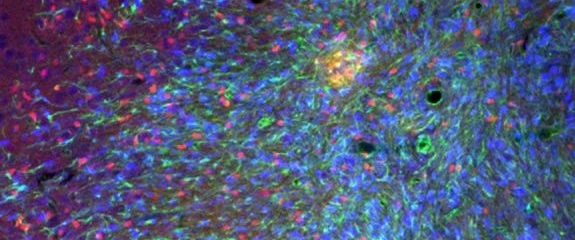Experimental therapy halts treatment-resistant brain tumors in mouse model

Researchers report in the journal Cancer Cell an experimental therapy that in laboratory tests on human cells and mouse models stops aggressive, treatment-resistant and deadly brain cancers called glioblastoma and high-grade gliomas.
Testing a multi-step therapeutic strategy, the scientists found a way to use a gene therapy to shut down a gene long-implicated in the formation of high-grade gliomas called Olig2. The protein encoded by Olig2 is expressed in the majority of gliomas. Removing the Olig2 gene halts tumor growth, while elimination of Olig2-producing cells blocks tumor formation.
"We find that elimination of dividing Olig2-expressing cells blocks initiation and progression of glioma in animal models and further show that Olig2 is the molecular arbiter of genetic adaptability that makes high-grade gliomas aggressive and treatment resistant," said Qing Richard Lu, PhD, lead investigator and scientific director of the Brain Tumor Center at Cincinnati Children's. "By finding a way to inhibit Olig2 in tumor forming cells, we were able to change the tumor cells' makeup and sensitize them to targeted molecular treatment. This suggests a proof of principle for stratified therapy in distinct subtypes of malignant gliomas."
Researchers caution the experimental therapeutic approach they describe requires extensive additional research and remains years away from possible clinical testing. Still, Dr. Lu said the data are a significant research breakthrough. The current study finds a potential chink in the molecular armor of these stubborn cancers that -- even after an initial round of successful treatment -- almost always relapse and kill the patients who get them.


